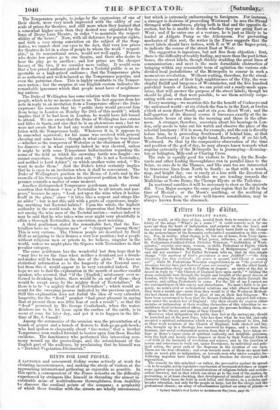HINTS FOR LOST PEOPLE.
A 1.arna]ILx and concurrent feeling--seems: actively at work for obviating inconveniences, and making the abode of visiters at the approaching international gathering as enjoyable as possible. In this spirit, a. correspondent of the Times remarks on the difficulty experienced by strangers like himself in threading the almost in- extricable maze • of multitudinous thoroughfares, from inability to _discover the". cardinal points of the compass; a perplexity- of which those familiar with,the_ streets are wholly unconscious'''. but which is extremely, embarrassing to foreigners. For instance, a stranger is desirous of proceeding Westward : he sees the Strand thronged with omnibuses, plying both in that and the opposite di- ;. reetion, but he is unable to decide whether they are going East or , West; and if he enter one at a venture, be is just as likely to be landed at Aldgate Pump as the ,Athenaeum. For preventing. mockeries of this sort, the writer in the Times suggests that the street labels should have indices, with 'E or W at the finger-point,„ , to indicate the course of the street East or West
The ingenious, suggestion is ingenious but not free from objection : first, i
there is the difficulty of readily finding, any more than the post letter- boxes, the street labels, though thickly studding, the great lines. of ' communication ; and next is the more formidable obstruction of bringing within any reasonable term of agitation the various sub- divided local jurisdictions of the Metropolis to concur- in such a momentous revolution. Without waiting, therefore, for the simul- taneous movement of their high mightinesses of the City, the wor- shipful Bailiff and burgesses of Westminster, and the five hundred parochial boards of London, we can point out a ready-made appa- ratus, that will answer the purpose of the street labels; though we should be glad, if that were possible, to see them actively • cotipe- rating with our own discovery.
Every morning--we mention this for the benefit of Cockneys and the unlearned world—at six o'clock the Sun is in the East, at twelve o'clock at noon direct South, and at six p.m. direct West; and the half-quarters of its diurnal course it traverses exactly at the in- termediate hours of nine in the mo
and three in the after- noon. A stranger, therefore, uncertairnnnr5,;out his bearings in Lon- don, only needs to take out his watch and observe the place of the celestial luminary : if it is noon, for example, and the sun is directly before him, he is proceeding Southward ; if behind him, at that hour, Northward; if on his right hand, Eastward; if on his left, Westward. So that by the comparative observation of the time and position of the god of day, he may always know towards what angular extremity of the Metropolis he is journeying—Kenning- ton or Islington, Mile-end or Charing Cross. The rule is equally good for visiters to Paris; the Boule- vards and other leading thoroughfares run in paralel lines to the Seine, as ours do to the Thames and like ours too are intersected ..
by transverse lines from North South : so that with a watch, , map, and bright day, one is rarely at a loss with the direction of ' the Parisian vehicles, or whether we are tending towards the Madeleine or Notre Dame, the Champs Elysee or the Tuileries.
In nocturnal rambles it will be necessary to steer as the.ancienta did. Ursa Major occupies the same polar, tegion that he did in the time of Hesiod ; or the Moon's soothing, or the southing of Pegasus, Cassiopeia, or other well-known constellation, may be always known from the almanack.


























 Previous page
Previous page